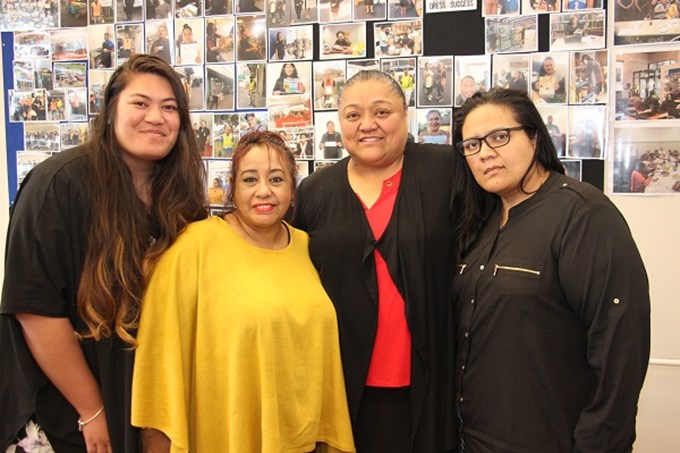This month, OurAuckland is meeting some of the people who work 'behind the scenes' to make Tāmaki Makaurau a great place to live.
As the largest urban transformation project in New Zealand, Tāmaki Regeneration Company – TRC – is overcoming initial scepticism and fears from its predominantly Pacific and Māori population as it builds 7500 new homes in east Auckland, generating employment opportunities and aiming to create a thriving, attractive, sustainable and self-reliant community.
Leading the job hunt is Alice Taupau, who manages the Tamaki Jobs and Skills Hub in Glen Innes, helping young locals upskill and gaining growing support.
When Alice Taupau started working for the Auckland Chamber of Commerce in 2014 to run an employment programme for the Tāmaki Regeneration Company (TRC), she admits she wasn’t sure what she was getting into.
“When I first started working in the community, it was a little tough and people were understandably wary. There were huge changes happening."
There was a stigma attached to the young people of Tāmaki; that they didn’t want to work and had no ambition. I’ve come to find the opposite true.”
“It’s our role to use our contacts with the local business people to liaise with community champions and other providers to join our youth employment programme (eligible for 18- to 25-year-olds from the area) which can help them find jobs.”
Employment challenges
Getting them ready for employment has its challenges. Alice says there’s an assumption among the mainstream population everyone has identification, a bank account, proof of address. But a significant number don’t.
“A young man came in the other day just to get his driver’s license. He needed a passport, a proof of his address … and the amount of form-filling can seem a bit overwhelming,” she says.
“It’s our role to help them gather all the info required. It takes time, but it’s worth it. Those with a full driver’s license are seven times more employable than those without. Besides being solid proof of who they are, it tells employers that they’re smart enough to get through the stages to earn it.”
Training available
In some cases, TRC will provide funding for training and upskilling such as machinery licences and compliance certification, courses that are often out of reach because they are too expensive.
“We’ll consider it because, in the long run, we’ll have a person who’s fully qualified, in gainful employment and is therefore contributing positively to our society. It’s a far more positive outcome than being unemployed with limited prospects. It’s changing lives, which I’ve seen myself.”
Alice insists they don’t mollycoddle and do everything for them.
“We clearly express our expectations, and the commitment behind TRC which provides the opportunities,” she says.
Helping people do better
“We’re actually like tough aunties. But behind all our lecturing is aroha … love. Right down to where the rubber hits the road, we want people to do better for themselves and for their whānau.
“The popularity of the hub has attracted a number who participated to come back and help out. It’s a sign they felt welcome, and part of it all. They want to give back, too.”
One question Alice is often asked by those visiting the Jobs & Skills hub is what’s in it for her and TRC.
“They ask if we get a commission and we say no. At first, that question surprised me, but they’ve since come to trust us. For a long time, they didn’t. I think they wanted to see if we really ‘walked the talk’ and that we followed through with what we promised.
“But the fact we’re still here, doing what we said we’d do, has turned things around.”
Interest spreading to other areas
The growth in interest from neighbouring schools has spread beyond Tāmaki into its neighbouring east Auckland suburbs.
“The only school TRC originally worked with was Tāmaki College (in Glen Innes). Now other schools from nearby areas are approaching us with details of their open day and visits from career advisors’ neighbouring schools.”
When Alice, whose parents are from Samoan islands of Savaii and Manono, returned to live in New Zealand after 20 years in Australia, gaining a Masters’ Degree in Sociology at the University of Auckland, the TRC was in its infancy.
She recalls seeing plenty of media coverage about TRC’s programme on her return.
“There was a common fear among the community that their homes were going to be torn down and replaced by ‘brand new flash homes owned by rich people’. The stories and media coverage tended to portray it that way, and if you didn’t know, it would be easy to believe that,” she says.
“But when I started to work here I realised it wasn’t the case. The social housing programme is providing a far better environment for families than the cold, damp homes that were falling apart. The company itself works to deal with issues in a considerate and respectful way.
“Now we’re seeing families living in modern, well-insulated homes which has seen their health improve dramatically and the amount of support for the project grow. That can only be good.”
Transforming families together
One family epitomises how the regeneration of Tāmaki has transformed the area.
“There was a family group of 15, they covered three generations of living in social housing and weren’t in employment,” Alice recalls.
“But when one of them went out to get a job, and succeeded with some support from us, others in the family started to follow. It created a new generation with a stronger purpose and ambition. That’s got to be good.”


